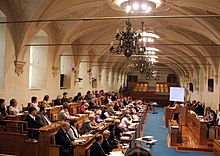Senate of the Czech Republic
|
Senate of the Czech Republic Senát Parlamentu České republiky |
|
|---|---|
 |
|
| Type | |
| Type | |
| Leadership | |
|
President
|
|
|
1st Vice-President
|
|
|
Vice-President
|
|
|
Vice-President
|
|
|
Vice-President
|
|
| Structure | |
| Seats | 81 |
 |
|
|
Political groups
|
|
| Elections | |
| Two-round system | |
|
Last election
|
7–8 October 2016 14–15 October 2016 |
| Meeting place | |
 |
|
| Wallenstein Palace, Prague | |
| Website | |
| www.senat.cz | |
The Senate of the Czech Republic (Czech: Senát Parlamentu České republiky), usually referred to as Senát, is the upper chamber of the Parliament of the Czech Republic. The seat of the Senate is Wallenstein Palace in Prague.
The Senate has 81 members, elected for six years, every two years one third of them, in one-seat constituencies through two rounds majority system (the second round is between two candidates with highest number of votes from the first round – if no candidate obtains 50+% majority in the first round). A candidate for the Senate does not need to be on a political party's ticket (unlike the lower chamber).
The senate has one President and four Vice-Presidents. Its members participate in specialised committees and commissions.
The Senate Chancellery has been created to provide professional, organisational and technical services. The Senate occupies several historical palaces in centre of Prague, in Malá Strana quarter. In 2005 its budget was 561.2 million CZK.
The Senate can delay a proposed law which was approved by the Chamber of Deputies but this veto can be overridden by an absolute majority (i.e. at least 101 of all 200 members) of the Chamber of Deputies in a repeated vote. The Senate however cannot be overridden when it votes on constitutional law and on international treaties.
Senate decides on confirmation of judges of the Constitutional Court, proposed by the President, right it often uses to block unacceptable nominees, and may propose new laws. However, the Senate does not get to vote on the country budget and on confidence in the government, unlike the Chamber of Deputies.
...
Wikipedia
